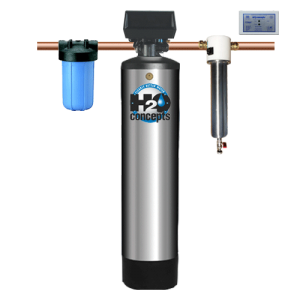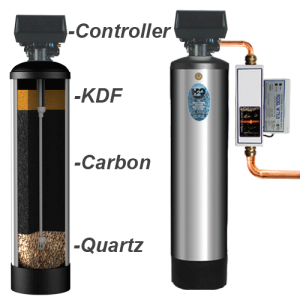 What is the Difference between a Salt Water System and a No Salt Water System?
What is the Difference between a Salt Water System and a No Salt Water System?
For home and business owners who are looking into water conditioning solutions, there seems to be a lot of confusion over what is the difference between a salt water system and a no salt water system. It’s important to do a fair amount of research into water softening systems to make sure you end up with the option that best meets your needs.
We’ve created this brief guide to help you learn the difference between salt-dependent and no-salt water conditioning systems so you can make an informed choice.
Salt-Based Water Softening Systems
Water softening systems have been around for decades but few people truly understand what is the difference between a salt water system and a no salt water system. Probably the best way to examine the differences between the two is to look at how each system works plus their pros and cons. First up, we’ll look at salt-based systems:
How the System Works
We all know that treated water is better for you, but do you have any idea how a water softener actually works? It’s a lot more complicated than you might think.
Salt-dependent water treatment systems utilize a process called “ion exchange.” During this process, calcium and magnesium ions that cause hard water are removed and replaced by sodium. The softened water with the additional sodium is then sent into your home while wastewater containing magnesium and calcium is discharged down your drainage system.
Pros
 One of the biggest benefits of salt-based systems is that they completely rid your water of all calcium and magnesium. Even though calcium and magnesium are beneficial (and even essential) to the human body, they do tend to build up on plumbing fixtures.
One of the biggest benefits of salt-based systems is that they completely rid your water of all calcium and magnesium. Even though calcium and magnesium are beneficial (and even essential) to the human body, they do tend to build up on plumbing fixtures.
Soft water has a slick feel to it, which allows shampoos and soaps to bubble up and create a lot of lather.
Another benefit is that you won’t have to deal with scale building up in pipes and on fixtures. In most cases, this will provide your fixtures and appliances with a longer lifespan.
Cons
Water softening systems that use salt are usually fairly large in size, which could take up a lot of room in your home.
Salt-based systems also tend to be pretty expensive, so be prepared to make a hearty investment in exchange for soft water.
You have to replenish the salt in the system regularly; for a family of four, you’ll probably need 50 lbs. of salt every month.
Due to the complexity of the machinery, this type of system requires routine maintenance.
No-Salt Water Treatment Systems
The goal of a no-salt water treatment system is the same as a salt-based one: to create tasty water that’s healthy to drink but safe for your plumbing. The way that each system goes about achieving that goal differs, though.
Now that you’ve had a look at what salt-based water softeners have to offer, let’s check out no-salt water treatment systems:
How the System Works
 In a no-salt water conditioning system, the water is sent through a series of filters. These filters not only remove algae, bacteria, chlorine, and heavy metals, they also drastically reduce the amount of magnesium and calcium in your water. The small amount of magnesium and calcium that remains has been changed into a water-soluble form, which means it’s much less likely to create build up.
In a no-salt water conditioning system, the water is sent through a series of filters. These filters not only remove algae, bacteria, chlorine, and heavy metals, they also drastically reduce the amount of magnesium and calcium in your water. The small amount of magnesium and calcium that remains has been changed into a water-soluble form, which means it’s much less likely to create build up.
Pros
Salt-free water treatment systems are a lot less expensive than their salt-dependent cousins. They’re also considered to be virtually maintenance-free.
Salt-free systems don’t require the use of electricity, which means your utility bills will be lower if you purchase this system instead of a salt-based one.
You also don’t have to worry about having a drain nearby – there’s no wastewater discharged so you’ll have more options when it comes to placement of the system.
And speaking of wastewater – because salt-free water softeners don’t discharge any chemical-laden runoff, they’re definitely the eco-friendly solution to hard water problems.
Cons
If you already have a serious problem with lime-scale buildup, you might be disappointed to learn that not all of the magnesium and calcium elements that cause buildup are removed with no-salt systems. This point straddles the pro/con line, though, because these minerals are essential to the human body so keeping some of them in the water could prove to be beneficial.
Because they don’t rely on electricity to run, it might take a while longer to see the benefits of no-salt water systems.
Contact H2o Concepts for More Information
If you’d like to learn more about what is the difference between a salt water system and a no salt water system, we invite you to give us a call; we’d love to talk to you about the many water treatment options we have available. You can reach us by phone at 1-888-275-4261 or by filling out the contact form on our site.

